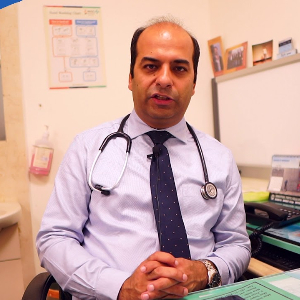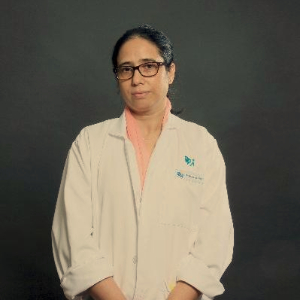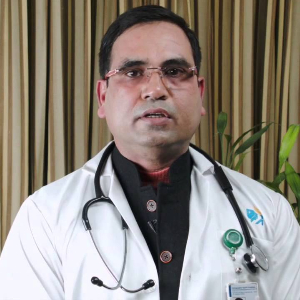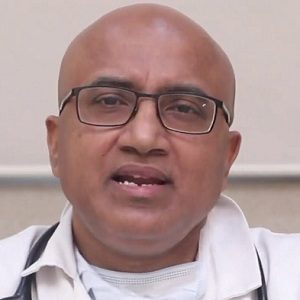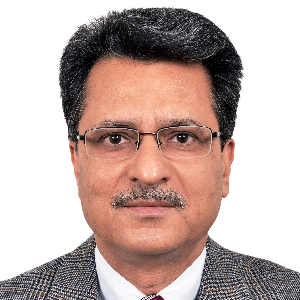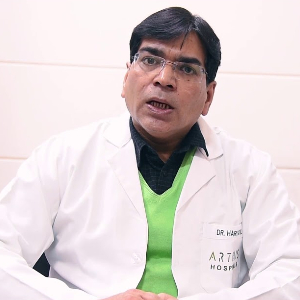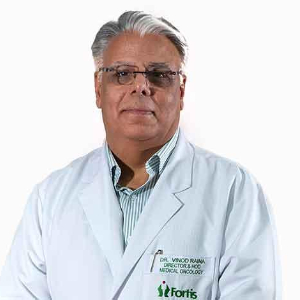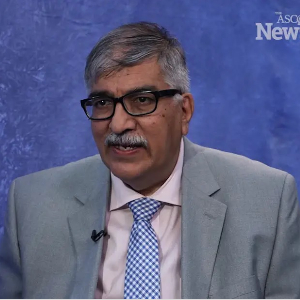Best Doctors in India for Malignant Mesothelioma Treatment
- Medical Oncologist, Gurugram, India
- Over 16 years’ experience
Profile Highlights:
- Dr. Ankur Bahl is a reputed medical oncologist in India.
- With over 16 years of experience, Dr. Bahl is considered for his expertise in treating Multiple Myeloma, Lymphoma, Leukemia, Gastrointestinal tumors, Gynaecological Tumors, Head, Neck, and Brain Tumors.
- Surgical Oncologist, New Delhi, India
- Over 20 years’ experience
Profile Highlights:
- One of the finest oncologists in India, Dr. Ruqaya Ahmad Mir has been practicing surgical oncology for the past 20 years and is currently functioning as a Senior Consultant, Oncology at Indraprastha Apollo Hospital, New Delhi.
- Dr. Ruqaya Mir is known for her outstanding performance in some of the advanced surgical techniques which include Uterus and Ovary and Limb Conservation surgery and Cytoreductive surgery and Hyperthermic Intraperitoneal chemotherapy for advanced colorectal and recurrent ovarian malignancies.
- She is also a well trained Robotic Surgeon practicing implementation of minimal invasion in surgical oncology.
- Medical Oncologist, New Delhi, India
- Over 20 years’ experience
Profile Highlights:
- Dr. P K Das is one of the best Oncologists in India with an extensive career as the Senior Consultant Medical Oncologist, the Hemato- Oncologist, and Academic Coordinator of Dept of medical oncology at the Apollo Cancer Institute in New Delhi.
- With many years of experience at the Apollo Hospital, Dr. P K Das has been diligently treating patients and proactively contributing to the medical sector by working alongside topmost doctors in medical oncology.
- Medical Oncologist, New Delhi, India
- Over 15 years experience
Profile Highlights:
- Dr. Dipanjan Panda is one of the well-known medical oncologists in India, having 15 years of expertise in treating bone and soft tissue cancers and gastrointestinal cancers.
- He is credited with starting the country’s first anticancer departments and PDCC program. Dr. Panda developed a medical oncology unit at Indraprastha Apollo Hospital in New Delhi, in association with the Institute of Liver and Biliary Sciences. He is currently working at Indraprastha Apollo Hospital in New Delhi as a Senior Consultant, Medical Oncology.
- Dr. Panda has written twenty peer-reviewed papers in national and international journals. He has presented numerous talks at global forums.
- Medical Oncologist, New Delhi, India
- Over 20 years’ experience
Profile Highlights:
- Dr. Amit Agarwal is a highly successful Medical Oncologist whose primary focus lies on pain management in cancer patients and provides treatment specifically for the management of early stages of Hodgkin’s disease and Non-Hodgkin Lymphoma, Non-Metastatic Ewing’s Sarcoma, Cardiopulmonary Resuscitation, and emergency medications for cancer patients.
- Dr. Agarwal has been part of other prestigious cancer hospitals where he has helped in the treatment of patients with various types and rare cases of cancer.
- Medical Oncologist, Gurugram, India
- Over 30 years’ experience
Profile Highlights:
- Dr. Ashok Kumar Vaid is a reputed Medical Oncologist in India with expertise in the treatment of blood, lungs, skin, breast, and gastrointestinal cancers.
- He is famously known for performing among the first 25 bone marrow transplants in a private hospital in India.
- Dr. Ashok Vaid’s primary area of focus lies in Leukemia, Lymphoma, Solid tumors, and the treatment of organ-specific benign and malignant tumors.
- He prefers to treat his patients using non-surgical and pain-free techniques that include hormone therapy, biological therapy, targeted therapy, and chemotherapy.
- Hematologist and Medical Oncologist, Gurugram, India
- Over 30 years’ experience
Profile Highlights:
- Dr. Hari Goyal is the head of the Oncology unit comprising some of the finest oncologists in the country. The team effort gives an edge & advantage to the patients’ management.
- His contribution to oncology is immense & has developed drugs for the management of chemotherapy side effects. This development has helped millions of cancer patients since 2004.
- Dr. Hari Goyal was a part of a large number of clinical trials of cancer research including one of the FDA audited trials.
- Medical Oncologist, Gurugram, India
- Over 38 years’ experience
Profile Highlights:
- Dr. Vinod Raina is among the top and renowned Medical Oncologists in India with more than 38 years of extensive experience in the field.
- His primary expertise lies in Chemotherapy and is the first to perform high-dose chemotherapy in India. He also performed the first peripheral blood stem cell transplant in India.
- He has performed more than 250 bone marrow transplants and over 70 allotransplants for different types of cancers.
- Medical Oncologist, New Delhi, India
- Over 20 years experience
Profile Highlights:
- Dr. Manish Singhal is a renowned Medical Oncologist from India practicing the best cancer treatment for over 20 years.
- He is a gold medalist doctor who received specialized training in hematopoietic stem cell transplantation from world-renowned BMT specialists.
- Dr. Singhal is specifically interested in gastrointestinal cancer, GU, breast cancer, leukemia, and lung cancer. He excels in all modalities of chemotherapy, immunotherapy, and the management of oncological emergencies, along with patient medical care.
- Director and Head Medical Oncology/Hematology, Gurugram, India
- Over 40 years’ experience
Profile Highlights:
- Dr. Rakesh Chopra is a well-known Medical Oncologist with national and international repute as one of the best in the treatment of all types of blood cancers including leukemia, lymphoma, multiple myeloma, and bone marrow transplant.
- His specialization lies in blood cancer and also provides treatment for solid cancers of the breasts, lungs, prostate, colon, and GI.
Best Hospitals in India for Malignant Mesothelioma Treatment
Indraprastha Apollo Hospital, New Delhi
- City: New Delhi, India
Hospital Highlights:
- Indraprastha Apollo Hospital is a 700-bedded multispecialty hospital in the heart of the capital of India. It is a part of Apollo Hospital group, one of India’s most reputed healthcare chains. Indraprastha Apollo Hospital has been accredited by Joint Commission International, making it the first internationally accredited hospital in the country in 2005.
- There are 52 specialties in the hospital with one of the best cardiology centers in the country. The hospital is also equipped with State of the art infrastructure facilities with the largest Sleep Lab in Asia and the largest number of ICU bed facilities in India.
- The hospital also has one of the largest dialysis units in India along with a dedicated Bone Marrow Transplant unit.
- The latest and highly advanced technologies that are installed in the hospital include Da Vinci Robotic Surgery System, PET-MR, PET-CT, Cobalt-based HDR Brachytherapy, Brain Lab Navigation System, Tilting MRI, Portable CT scanner, 3 Tesla MRI, 128 Slice CT scanner, DSA Lab, Endosonography, Hyperbaric Chamber and Fibro scan.
Fortis Memorial Research Institute, Gurugram
- City: Gurugram, India
Hospital Highlights:
- Fortis Memorial Research Institute is a multi-super-specialty, quaternary care hospital with 1000 beds. The hospital comprises reputed clinicians, and international faculty and is also equipped with cutting-edge technology. The hospital is a part of Fortis Healthcare Limited, a reputed chain of private hospitals in India.
- It is a NABH-accredited hospital that is spread across 11 acres of land and has a capacity of 1000 beds. The hospital has 55 specialties and is one of the premier health care centers in the Asia Pacific region popularly known as “the Mecca of Healthcare”.
- The hospital has 260 diagnostic centers and is also equipped with the latest and advanced techniques that include 3 Telsa which is the world’s first Digital MRI technology. The hospital also has world-class Radiation Therapy techniques which have been developed by leading technology experts from Elekta and Brain Lab.
Apollo Hospital, Chennai
- City: Chennai, India
Hospital Highlights:
- Apollo Hospitals, Chennai, is one of the best hospitals for heart care in India. Over the years, Apollo has expanded all over India, as a healthcare chain.
- India’s first ‘Only Pancreas’ transplant was performed in Apollo Hospital. The hospital is known for successfully performing Asia’s first en-bloc combined heart and liver transplant, and over the years, it has attained a remarkable achievement in the global healthcare space. Around 3-4 organ transplants are performed in the hospital per day.
- Equipped with over 500 beds, this hospital in Chennai was established in 1983 and since then has been among the most preferred hospital for patients from all over the world.
- The hospital holds accreditation of the NABH and JCI and is the first hospital in India to be ISO 9001 and ISO 14001 certified. It is also the first South Indian Hospital to receive subsequent reaccreditation from the JCI USA 4 times.
Medanta-The Medicity, Gurgaon
- City: Gurugram, India
Hospital Highlights:
- One of India’s best and largest multi-specialty hospitals, Medanta was built with the aim to bring India to the highest standards of medical care. The hospital has been providing the best medical services to its patients, since its inception, with care, commitment, and compassion.
- Equipped with 1250 beds, the hospital was founded by Dr. Naresh Trehan in the year 2009 with an aim to provide the best medical care at affordable costs. The hospital is spread across 43 acres and includes 45 operation theatres and 350 beds dedicated solely to ICU. The hospital includes over 800 doctors, and more than 22 specialty departments and has a dedicated floor for individual specialty in order to offer the best services under one roof.
- The hospital is considered one of the premier institutes in India for Cardiac Care and includes staffs and members of high caliber. The hospital has 6 distinct centers of excellence.
Max Super Specialty Hospital, New Delhi
- City: New Delhi, India
Hospital Highlights:
- One of the well-regarded providers in India committed to the highest standards of clinical excellence and patient care, Max Super Specialty Hospital is a part of Max Healthcare, which is the second-largest healthcare chain in India. Regarded as one of the most well-regarded healthcare providers in the country, Max Super Specialty Hospital is committed to the highest standards of clinical excellence as well as patient care. The hospital is also equipped with the latest technology as well as cutting-edge research. The hospital is known to deliver and ensure the highest level of patient care.
- The hospital has more than 500 beds and offers treatment for over 35 specialties. The hospital also holds the credit of having installed the first Brain Suite in Asia. This is a highly advanced Neurosurgical machine that allows MRI to be taken while surgery is ongoing.
- Other advanced and latest technologies are also installed in the hospital such as the 1.5 Tesla MRI machine, 64 Slice CT Angiography, 4D ECHO, LINAC, and 3.5T MRI machine.
Artemis Hospital, Gurugram
- City: Gurugram, India
Hospital Highlights:
- One of the most well-known hospitals in the Delhi NCR, Artemis Hospital is the first hospital in Gurugram to get accredited by the Joint Commission International.
- With more than 40 specialties, the hospital has been designed to be one of the most technically advanced hospitals in the country, with the best medical and surgical health care. The hospital has eleven special and dedicated centers, for Heart, Cancer, Neurosciences, etc.
- The latest technologies in the hospital include Endovascular Hybrid Operating Suite and Flat panel Cath Labs for the cardiovascular department, 3 Tesla MRI, 16 slice PET CT, 64 Slice Cardiac CT Scan, HDR Brachytherapy, and highly advanced Image Guided Radiation Therapy techniques (LINAC) are installed in the hospital.
- The hospital has won several awards as well, since its inception.
BLK Max Super Specialty Hospital, New Delhi
- City: New Delhi, India
Hospital Highlights:
- Equipped with 650 beds, BLK Superspecialty Hospital is the largest stand-alone private sector hospital in Delhi.
- With over 1500 healthcare providers and 150 globally renowned super specialists, the hospital is one of Asia’s largest Bone Marrow Transplant Centres. The hospital is known for having some of the best cancer doctors in the country.
- The hospital is NABH and NABL accredited and was inaugurated by the first Prime Minister of India. Pt. Jawahar Lal Nehru.
Gleneagles Global Hospitals, Chennai
- City: Chennai, India
Hospital Highlights:
- Established in 1999, Gleneagles Global Hospital, Chennai, is one of the top healthcare facilities in Southern India. It is part of the Gleneagles Hospital Chain, which is the fourth largest healthcare chain in the country. The hospital specializes in multi-organ transplants of kidneys, liver, lungs, heart, etc.
- The hospital has an excellent infrastructure and state-of-the-art lab and equipment set-up. The hospital boasts cutting-edge technologies, a highly skilled team of doctors and surgeons, and trained support staff. Located in Perumbakam, Chennai, it is one of India’s premier health care destinations. The hospital has performed some of the most complex surgical and clinical procedures in India including multi-organ transplantations.
- The hospital’s lung transplantation program is one of the best in the country. The hospital is known for having performed India’s first single lung transplant and first minimal invasive lung transplant. It is also the only Indian hospital to be associated with King’s College Hospital, London, United Kingdom for liver transplantations.
Fortis Hospital, Mulund, Mumbai
- City: Mumbai, India
Hospital Highlights:
- Fortis Hospital in Mulund is a 315-bed multi-speciality tertiary care hospital with five JCI accreditations that offers a wide variety of diagnostic and therapeutic services. The Fortis Hospital in Mulund delivers patient-centred treatment with cutting-edge technology, highly skilled and experienced surgeons, and paramedical staff.
- This institution houses Maharashtra’s largest multi-organ transplant centre. It is also the first heart transplant centre in western India to conduct 100 or more consecutive heart transplants in under four years. It is the only hospital in the city to have multi-organ transplants and has handled the youngest patient for angioplasty. Fortis Hospital Mulund now boasts the first advanced surgical robot in central Mumbai.
- Cardiology and heart surgery, urology, nephrology, neurosciences, orthopaedics, digestive care, emergency and critical care, and maternity care are among the services provided by the hospital.
Kokilaben Dhirubhai Ambani Hospital, Mumbai
- City: Mumbai, India
Hospital Highlights:
- Kokilaben Dhirubhai Ambani Hospital, Named after the wife of Indian industrialist Dhirubhai Ambani, the founder of Reliance Industries, this is one of the top hospitals in Mumbai. This 750-bed multi-specialty hospital became operational in 2009. Known as one of India’s most advanced tertiary care facilities, the hospital is designed to raise India’s global standing as a healthcare hub, with an emphasis on excellence in clinical services.
- Kokilaben Dhirubhai Ambani Hospital uses Protocol and Care Pathway based treatment models to ensure the best outcomes for patients.
- The hospital represents a confluence of top-notch talent, cutting-edge technology, state-of-the-art infrastructure, and, most importantly commitment.
- The hospital also holds the accreditation of the NABH, NABL, CAP, and JCI.
- The hospital has been recognized as the No. 1 Multispecialty Hospital in Mumbai and the West Zone for the fifth year in a row in 2020 by The Week.
Mesothelioma
Mesothelioma is a type of aggressive and deadly cancer. It occurs in the thin layer of tissue that covers the majority of your internal organs, also termed as the mesothelium.
Although treatment options are available for this condition, for many patients suffering from Mesothelioma, a cure is not possible. The average life expectancy for a patient after diagnosis is 12-21 months, though prognosis might improve with treatment.
Symptoms
Signs and symptoms of this condition generally depend on where this cancer occurs-
Pleural Mesothelioma: This type of Mesothelioma affects the tissue surrounding the lungs, and can cause various signs and symptoms such as:
- Chest pain
- Shortness of breath
- Painful coughing
- Unexplained weight loss
- Lumps of tissue under your chest skin
Peritoneal Mesothelioma: This type of Mesothelioma occurs in tissue in the abdomen, and can lead to signs and symptoms such as:
- Abdominal pain
- Nausea
- Abdominal swelling
- Unexplained weight loss
Other forms:
Although other forms of Mesothelioma also exist, but signs and symptoms are generally unclear, since these forms of the disease are generally rare.
Causes & risk factors
The most common and main risk factor for mesothelioma is working with asbestos. Asbestos is a group of minerals containing thin microscopic fibers, which are resistant to heat, fire as well as chemicals, and do not conduct electricity. Due to this quality, they are generally used widely in the construction, automotive, and other industries.
In the manufacturing process for asbestos, the fibers are released into the air, and they might be inhaled and swallowed, which can lead to serious health problems. The majority of mesothelioma cases are linked with exposure to asbestos during work. There is also evidence to suggest that family members and anyone living with asbestos workers also have an increased risk of developing this condition. This risk is generally the result of the dust brought home on the clothing and hair.
In some cases, Mesothelioma has also been reported in individuals with no known exposure to asbestos. Some of the uncommon but possible causes include:
Zeolites- These types of minerals are related to asbestos chemically. Exposure to erionite, another one of these related minerals, is also believed to be responsible for high rates of mesothelioma rates in areas such as Turkey, where it is commonly found.
Radiation- According to The American Cancer Society, there have been a few published reports of Mesothelioma that developed after exposure to high doses of radiation to the abdomen or chest after injections of thorium dioxide or thorotrast. This material was used by doctors in chest X-rays in the 20th century.
Genetics- According to some experts, certain people are also genetically predisposed to mesothelioma. Rates of the disease can vary among populations.
SV40 virus- Some studies in laboratory animals have also raised the possibility that infection with the simian virus 40 can increase the risk of developing mesothelioma.
Diagnosis
Physical exam
Imaging scans
Your doctor will likely order imaging scans such as a chest X-ray and a computerized tomography scan of your abdomen or chest, in order to look for abnormalities.
Based on the findings, you might need to undergo further testing in order to determine whether mesothelioma or another disease is leading to the symptoms.
Biopsy
Additional tests
Once your mesothelioma has been confirmed, your doctor might need to recommend additional tests in order to understand whether cancer has spread to lymph nodes or to any other areas in your body.
Tests can include:
- CT scans of your chest and abdomen
- Positron emission tomography (PET)
- Magnetic resonance imaging (MRI)
Your doctor is going to determine which tests are appropriate for you. Then he/she is going to use the information from these tests to assign a stage to your cancer, which ranges from I to IV. The lower the number, the more it is likely to be localized to the area around the lungs, and the higher it is, the more likely it is that the cancer has spread to other areas of your body. Once your doctor is able to identify the cancer stage, he/she is going to select the treatments that are right for you.
Treatment
While deciding the treatment option for you, your doctor considers several factors such as your overall health, the stage, or your cancer as well as its location.
Unfortunately, this condition is generally aggressive, and for most people, a cure isn’t possible. It is also usually diagnosed at an advanced stage when removing the cancer is not possible, through an operation. Therefore, your doctor might work to control it.
Surgery
Chemotherapy
Chemotherapy involves using chemicals to kill cancer cells. Systemic chemotherapy is able to travel throughout the body and might help to shrink or slow the growth of a mesothelioma that is not removable through surgery. Chemotherapy can sometimes also be used before surgery to make the operation easier or in some cases, after surgery, for reducing the chance that cancer will return.
Chemotherapy drugs can also be heated and be directly administered into the abdominal cavity, in the case of peritoneal mesothelioma.
Radiation therapy
Radiation therapy focuses high-energy beams from sources such as protons or X-rays to a specific spot or spots on the body. Radiation can also be used after surgery for killing any remaining cancer cells. It might help in reducing symptoms of advanced cancer as well, in situations where surgery is not an option.
Immunotherapy
Targeted Therapy
Complications
As your pleural mesothelioma continues to spread in the chest, it can put pressure on the structures in that area, leading to complications such as difficulty in breathing and swallowing, chest pain, pain caused by pressure on the nerves and spinal cord, and accumulation of fluid in the chest, which can compress the lung nearby and make breathing even more difficult.
Prevention
In order to prevent this condition, it is important to reduce your exposure to asbestos. Workers who might encounter asbestos fibers include:
- Asbestos miners
- Plumbers
- Pipefitters
- Electricians
- Insulators
- Demolition workers
- Selected military personnel
- Shipyard workers
- Home remodelers
- Brake mechanics
If you are any of the above, then it is important to ask your employer, whether you have a risk of asbestos exposure on the job.
Remember to follow all safety precautions in your workplace, which includes wearing protective equipment. It is also best if you shower and change out of your work clothes before you are taking a lunch break or going home. You can talk to your doctor to ask if you need to take any further precautions.

